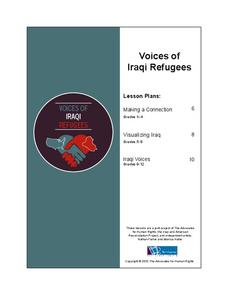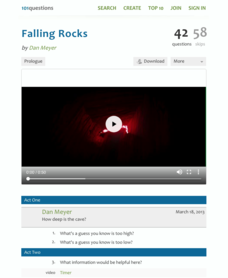Museum of Tolerance
Creating an Ideal World
To conclude a study of social justice and tolerance designed to prepare classes for a visit to the Museum of Tolerance, class members brainstorm a safe and peaceful world. They then write about their own vision of this world.
EngageNY
Dividing by (x – a) and (x + a)
Patterns in math emerge from seemingly random places. Learners explore the patterns for factoring the sum and differences of perfect roots. Analyzing these patterns helps young mathematicians develop the polynomial identities.
EngageNY
Events and Venn Diagrams
Time for statistics and learning to overlap! Learners examine Venn Diagrams as a means to organize data. They then use the diagrams to calculate simple and compound probabilities.
Teach Engineering
Protecting Our City with Levees
Teams use the design process to design, build, and test a model levee to protect the town from a wall of water. A handout provides a price list for the materials learners can use to build their levee within a budget.
Teach Engineering
A Simple Solution for the Circus
Class members are challenged to design a device that will move a circus elephant into a train car. Groups brainstorm ideas that use simple machines to load the elephant. They then choose one of their ideas, sketch a plan, and present it...
Teach Engineering
Tools and Equipment (Part 1)
Looking for the best inclined plane for the job? Groups calculate the theoretical mechanical advantage for four different inclined planes. They determine the actual mechanical advantage by measuring the amount of force needed for the...
Teach Engineering
Machines and Tools (Part 2)
Which pulley system will give us a whale of a good time? Teams compare the theoretical and actual mechanical advantages of different pulley systems. They then form a recommendation for how to move a whale from an aquarium back to the ocean.
Teach Engineering
Coordinates and the Cartesian Plane
The plot thickens to get a functional understanding. After a short review of plotting points on the coordinate plane, class members learn the difference between functions and relations in the second lesson in a series of nine. They...
Inside Mathematics
Hexagons
Scholars find a pattern from a geometric sequence and write the formula for extending it. The worksheet includes a table to complete plus four analysis questions. It concludes with instructional implications for the teacher.
Teach Engineering
Android Acceleration
Prepare to accelerate your Android. Pupils prep for the upcoming activity in this third installment of a four-part series. The lesson progresses nicely by first introducing different types of acceleration to the class. The teacher...
Advocates for Human Rights
Voices of Iraqi Refugees
The stated goal of this resource is to provide learners with basic facts about and build empathy for Iraqi refugees. To do so elementary classes develop a plan for how to welcome refugees to their classroom. Middle schoolers read...
Teach Engineering
Constructing Sonoran Desert Food Chains and Food Webs
Investigate desert biomes by creating food chains and food webs. Groups first research feeding habits of organisms in the Sonoran Desert. This information helps pupils draw food chains and webs to determine relationship between organisms.
Teach Engineering
Engineers Love Pizza, Too!
Help overcome challenges in eating pizza. Scholars work in groups to design a device that assists a physically handicapped person eat pizza. They build a prototype of such a device to test their designs before building. To...
Teach Engineering
Biomes and Population Dynamics - Balance Within Natural Systems
How large can a population become? The fifth installment of a nine-part unit teaches young ecologists about limiting factors that determine the carrying capacity of species in the Sonoran Desert. Here is a PowerPoint to help present this...
Teach Engineering
Projectile Magic
What do the movies October Key and Harry Potter and the Sorcerer's Stone have in common? The fourth installment of a five-part module presents equations regarding projectile motion and how to rearrange them. Scholars view video clips...
University of Southern California
Mastering Microbes
Small but mighty! Learners explore the role of microbes in a healthy ecosystem. An engaging activity asks pupils to design an aquaponics system that demonstrates that healthy microbes are necessary to maintain the ecosystem.
DiscoverE
Human Arch
Sometimes, we all need somebody to lean on. Scholars create a human arch by leaning against each other. They consider different approaches to making the arch sturdier and stronger.
Teach Engineering
Engineering and the Periodic Table
Elements, to the rescue! Scholars first review the periodic table, and then learn about the first 20 elements and their properties and uses in the fourth of six lessons in the Mixtures and Solutions unit. Applying their newfound...
101 Questions
Falling Rocks
Can you determine how far down a rock drops without visual clues? Viewers observe a clip from a movie testing vertical distance only based on sound. They must determine if it is safe to drop down themselves or if it is farther than their...
101 Questions
Falling Glowsticks
How can you determine the height of a drop off a cliff if you have nothing to measure it with? A movie clip sets up a sky-high challenge and solves it with a falling glow stick. Scholars must take the given information and decide how...
American Press Institute
Creating a Classroom Newspaper
Hot off the press: a mini-unit for class members to create their own newspaper. Complete with graphic organizers, extension activities, and helpful learning targets that teach parts of a newspaper, the resource contains everything needed...
Indiana Department of Education
Indiana K-12 Educators’ Resource Toolkit
Imagine a tool that magically engages readers in the classroom. A handbook for Indiana educators doesn't guarantee success, but it does offer a variety of strategies for teachers to try. The handbook opens with research-based theory...
Shakespeare Globe Trust
Fact Sheet: London
Overcrowded streets, pickpockets, the Black Plague ... what's not to love about medieval London? With the informative handout, scholars explore some of the city's famous landmarks, such as St. Paul's Cathedral. They also discover where...
Syracuse University
Erie Canal
While canals are not the way to travel today, in the first half of the nineteenth century, they were sometimes the best way to move goods and people. Scholars examine primary sources, including maps and pictures, to investigate the role...
Other popular searches
- Cost of Building Bridges
- Biographies of Ruby Bridges
- Types of Bridges
- Design of Suspension Bridges
- The Story of Ruby Bridges
- Different Types of Bridges
- Story of Ruby Bridges
- 4 Types of Bridges























